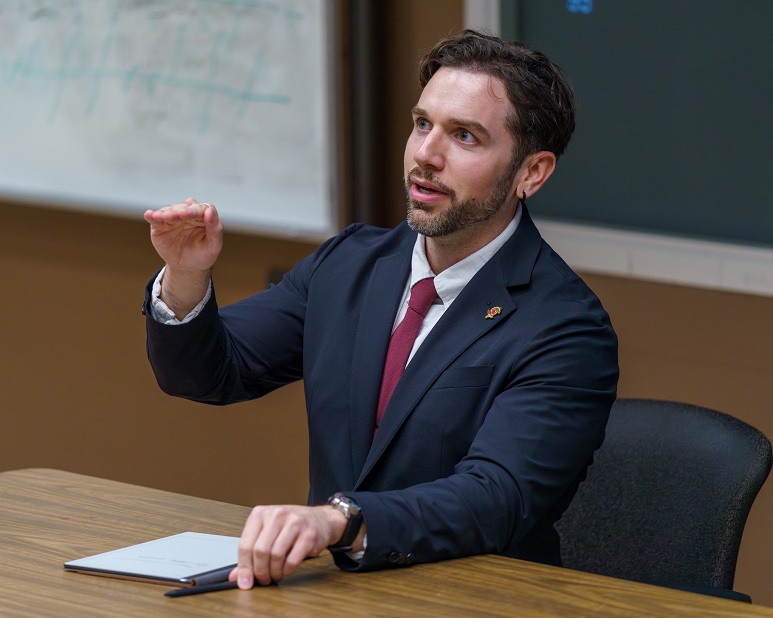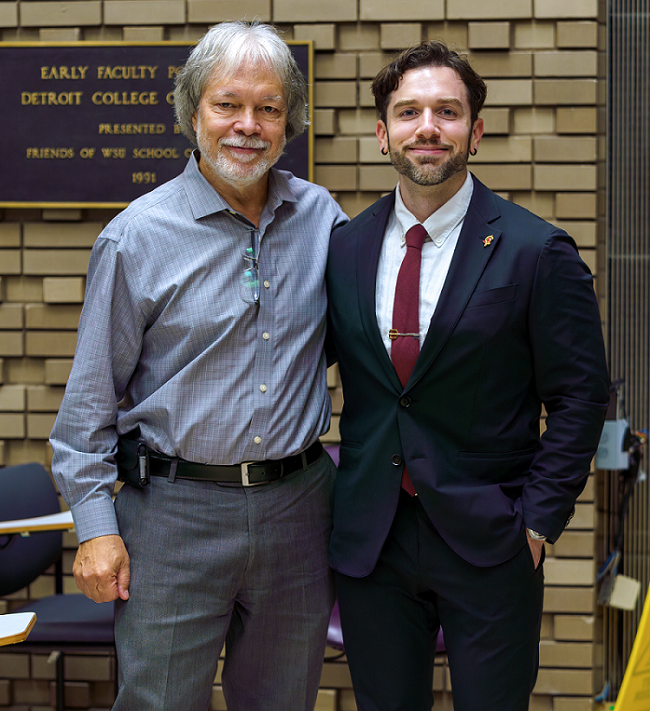
Taylor Vensko successfully defended his doctoral dissertation “The Way Out: Human Cytomegalovirus Multi-Ome and Virion Egress,” on Aug. 29 in a 40-minute presentation followed by 30 minutes of public discussion, the culmination of six years of study as graduate student at the Wayne State University School of Medicine.
Vensko, mentored by Philip Pellett, Ph.D., professor and chair of the Department of Biochemistry, Microbiology and Immunology, is staying at Wayne State to begin his professional career.
“It’s a big a relief, but it still hasn’t quite hit me yet. The actual defense day was one of the most stressful days of my life, but I was so proud to give my talk and to see my friends around,” Vensko said. “It was so rewarding to see friends, colleagues and collaborators from my department, other parts of WSU and other universities across the United States join in for the day. The defense is the greatest accomplishment of our entire graduate journey, and it’s really cool to see everything finally come together.”
Vensko joined the School of Medicine as a master’s student in the Biochemistry, Microbiology and Immunology Department in 2018 and defended that in 2022 in the middle of his doctoral degree studies. “I think all students would benefit from getting a M.S. before going into a Ph.D.,” he said.

Question: How would you describe your dissertation in lay terms?
Answer: I study how a herpesvirus, human cytomegalovirus, manufactures the infectious particles that are spread person to person and within an infected person. In my work, I highlight how the virus hijacks transportation systems within our cells for replication and spread. I also developed data science methods that combine complex datasets to guide experimental design.
Q: Why did you choose the School of Medicine for your doctoral studies?
A: Two Ph.D. students in the WSU Cancer Biology program came to University of Michigan-Flint as part of a recruiting event when I was in my last year of undergrad. They convinced me that a Ph.D. is what I really wanted to do, and I was interested in the research in the Biochemistry, Microbiology and Immunology Department that I joined. The biggest factor was how everyone treated me during the interview process. After the first interaction I had with Phil I knew I wanted to stay here and work in his lab, taking an M.S. position over Ph.D. at a lot of other universities.
Q: What are your next steps?
A: I’ll be joining Dr. Hanaa Hariri’s lab in Biological Sciences at WSU as a post-doctoral researcher. She studies various aspects of lipid metabolism and storage, and I’ll be focusing on organelle-organelle interactions and organization.
Q: What about the area of research you are in is interesting to you and why?
A: I’ve been studying different aspects of intracellular transport since I was an undergrad in 2016, and it’s really cool to see how every biological process comes back to moving things through cells and from cell to cell. As a virologist, we can uncover a lot about cell biology by examining how viruses modify our cells for their replication. I think we’re at a point where we know a decent amount about a lot of things, but we still are decades away from understanding how all the individual pieces are connected. I think it’s really exciting to see how much more complex biology is compared to anything we’ve learned in any class and how we’re able to challenge classically defined paradigms with modern technologies.
Q: What advice would you give to someone defending?
A: Tell a small part of your story but tell it well. There’s no reason to show all the data you’ve generated during your time here.
Q: What advice to those just starting their doctoral studies?
A: Read a scientific article every day. You have to stay up to date in your field, know the history of your lab, and learn about new and cool things that you can apply to your research.
Leave your ego behind. Realize that as a first-year student you know less about pretty much everything than every other person you meet, and that’s okay. By the time you finish, you’ll know more about a few things than anyone else in the world. It’s so rewarding to have people come to you as an expert.
Learn from everyone you meet. Go to seminars in your department and other departments, take good notes and make friends in other fields. The more you learn the more you realize how you can connect all the different aspects of science into your own work.
Do you know a student who recently defended a doctoral dissertation? Send the name and email of the student to Andrea McPartlin at gd5273@wayne.edu.